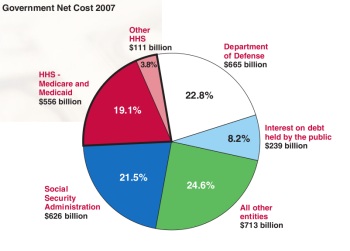 Today imagine that Congress has a fit of sanity and manages to balance the budget. They do it through a combination of spending cuts and tax increases. The dollar strengthens and there is more money because of interest that is not needed to pay for deficits. Congress’s approval rating soars and they decide to balance the budget from now on because the voters love it and so does the economy.
Today imagine that Congress has a fit of sanity and manages to balance the budget. They do it through a combination of spending cuts and tax increases. The dollar strengthens and there is more money because of interest that is not needed to pay for deficits. Congress’s approval rating soars and they decide to balance the budget from now on because the voters love it and so does the economy.
But there is still the outstanding debt of trillions of dollars. Congress in a display of unparalleled common sense tackles this by treating the debt as if it was a 30 year mortgage. In my scenario (sadly imaginary) Congress is able to secure a 3% fixed interest rate for 30 years. In the table below is the schedule of payments. I have included other rates of interest in the event that you think 3% is unrealistic.
The dollar amount of the debt is obtained from Treasury Direct’s Debt to the Penny, which I have rounded to the nearest billion dollars. The date in the top right-hand corner is the day the debt reading was taken. The highlighted figures are the yearly amounts paid (the sum of 12 monthly payments), depending on the interest rate. All dollar amounts are in billions. So for example, $13,616 billion, which is $13.6 trillion, just add nine zeros like so: $13,616,000,000,000.
I have been periodically updating the debt reading. It is scary how much this debt is rising. Truly we should avoid debt as we would avoid a plague. The sooner we start paying our mortgage the better. Default is not an option. Refinance now while interest rates are low.
Money Photo Credit: Andrew Magill

